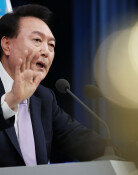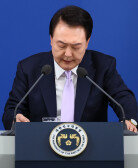Head of New Broadcast Commission Takes Over
Head of New Broadcast Commission Takes Over
Posted March. 27, 2008 08:13,
The birth of our organization [the Broadcasting and Communications Commission] will surely and hopefully open a new era for broadcasting and communications. We will break down the wall dividing the broadcast and communications industries. The synergy from this marriage will contribute to advancing the national economy and improving the quality of life for our citizens.
The head of the new Broadcasting and Communications Commission, Choi Si-jung, made the comments yesterday at his appointment ceremony in Seoul in a building formerly used by the now-defunct Information and Telecommunication Ministry.
The commission also held its first full session and elected Song Do-gyun deputy commissioner.
In a speech, Choi said, The whole world is watching renovation brought on by digital power. We cannot insist on separate systems for the broadcast and communications industries. Its against our national interests. We will modify laws and regulations to that cause, thereby stimulate competition among industries.
President Lee Myung-bak set up the commission to incorporate policies for the two sectors. Controversy and heated debate had plagued Chois confirmation to the post, leaving the commission leaderless for more than a month.
▽ Reform of state-invested networks
Upon passage of the Broadcasting and Communications Commission Act on Feb. 26, the commission prepared a report citing malfeasance committed by state-invested networks KBS and MBC. The commission promised in the report to overhaul both of them to have them live up to public expectations.
To put its plan into practice, the commission is expected to pass separate regulations for state-run broadcasters that are funded by viewer fees and for private broadcasters that generate revenue through advertising. The financial structures and management of state-run organizations will also be streamlined, and in the process, several of their subsidiaries will likely be privatized.
The Korea Broadcasting Commission, the predecessor of the new commission, was plagued by conflicts of interest among TV stations, including the big three networks KBS, MBC and SBS. Experts suggest the key to successful reform depends on how successfully the commission coordinates different positions.
▽ Merging print, broadcast and communications sectors
The commission also proposed in the report that it will remove market barriers separating the newspaper, broadcasting and communications industries from each other. Unlike previous governments, the Lee administration intends to allow cross-ownership by a newspaper company or a news agency of the other. Specifically, it will weed out regulations that prohibit a daily or a news agency from owning a TV or cable network or stations. The commission will also decide what to repeal and how to implement deregulation.
▽ Enactment of Communications Act
The dual regulation systems will also see an overhaul. The commission will push enactment of the Communications Act to incorporate broadcast and communications regulations into a single body of law. The most pressing need is to update implementation rules supporting Internet protocol TV. Authorities will screen out business entities for IPTV in the third and fourth quarters of this year. The commission has to iron out the conflicting interests of telecommunication giants such as KT and Hanaro Telecom and existing cable TV operators. Another problem is the high cost of telecommunication services.
Aware of all the difficulties, Choi kept silent despite a flood of reporters questions on his first day on the job.
raphy@donga.com nex@donga.com







